Coenzyme Q10 for heart failure
- PMID: 35608922
- PMCID: PMC8092430
- DOI: 10.1002/14651858.CD008684.pub3
Coenzyme Q10 for heart failure
Abstract
Background: Coenzyme Q10, or ubiquinone, is a non-prescription nutritional supplement. It is a fat-soluble molecule that acts as an electron carrier in mitochondria, and as a coenzyme for mitochondrial enzymes. Coenzyme Q10 deficiency may be associated with a multitude of diseases, including heart failure. The severity of heart failure correlates with the severity of coenzyme Q10 deficiency. Emerging data suggest that the harmful effects of reactive oxygen species are increased in people with heart failure, and coenzyme Q10 may help to reduce these toxic effects because of its antioxidant activity. Coenzyme Q10 may also have a role in stabilising myocardial calcium-dependent ion channels, and in preventing the consumption of metabolites essential for adenosine-5'-triphosphate (ATP) synthesis. Coenzyme Q10, although not a primary recommended treatment, could be beneficial to people with heart failure. Several randomised controlled trials have compared coenzyme Q10 to other therapeutic modalities, but no systematic review of existing randomised trials was conducted prior to the original version of this Cochrane Review, in 2014.
Objectives: To review the safety and efficacy of coenzyme Q10 in heart failure.
Search methods: We searched CENTRAL, MEDLINE, Embase, Web of Science, CINAHL Plus, and AMED on 16 October 2020; ClinicalTrials.gov on 16 July 2020, and the ISRCTN Registry on 11 November 2019. We applied no language restrictions.
Selection criteria: We included randomised controlled trials of either parallel or cross-over design that assessed the beneficial and harmful effects of coenzyme Q10 in people with heart failure. When we identified cross-over studies, we considered data only from the first phase.
Data collection and analysis: We used standard Cochrane methods, assessed study risk of bias using the Cochrane 'Risk of bias' tool, and GRADE methods to assess the quality of the evidence. For dichotomous data, we calculated the risk ratio (RR); for continuous data, the mean difference (MD), both with 95% confidence intervals (CI). Where appropriate data were available, we conducted meta-analysis. When meta-analysis was not possible, we wrote a narrative synthesis. We provided a PRISMA flow chart to show the flow of study selection.
Main results: We included eleven studies, with 1573 participants, comparing coenzyme Q10 to placebo or conventional therapy (control). In the majority of the studies, sample size was relatively small. There were important differences among studies in daily coenzyme Q10 dose, follow-up period, and the measures of treatment effect. All studies had unclear, or high risk of bias, or both, in one or more bias domains. We were only able to conduct meta-analysis for some of the outcomes. None of the included trials considered quality of life, measured on a validated scale, exercise variables (exercise haemodynamics), or cost-effectiveness. Coenzyme Q10 probably reduces the risk of all-cause mortality more than control (RR 0.58, 95% CI 0.35 to 0.95; 1 study, 420 participants; number needed to treat for an additional beneficial outcome (NNTB) 13.3; moderate-quality evidence). There was low-quality evidence of inconclusive results between the coenzyme Q10 and control groups for the risk of myocardial infarction (RR 1.62, 95% CI 0.27 to 9.59; 1 study, 420 participants), and stroke (RR 0.18, 95% CI 0.02 to 1.48; 1 study, 420 participants). Coenzyme Q10 probably reduces hospitalisation related to heart failure (RR 0.62, 95% CI 0.49 to 0.78; 2 studies, 1061 participants; NNTB 9.7; moderate-quality evidence). Very low-quality evidence suggests that coenzyme Q10 may improve the left ventricular ejection fraction (MD 1.77, 95% CI 0.09 to 3.44; 7 studies, 650 participants), but the results are inconclusive for exercise capacity (MD 48.23, 95% CI -24.75 to 121.20; 3 studies, 91 participants); and the risk of developing adverse events (RR 0.70, 95% CI 0.45 to 1.10; 2 studies, 568 participants). We downgraded the quality of the evidence mainly due to high risk of bias and imprecision.
Authors' conclusions: The included studies provide moderate-quality evidence that coenzyme Q10 probably reduces all-cause mortality and hospitalisation for heart failure. There is low-quality evidence of inconclusive results as to whether coenzyme Q10 has an effect on the risk of myocardial infarction, or stroke. Because of very low-quality evidence, it is very uncertain whether coenzyme Q10 has an effect on either left ventricular ejection fraction or exercise capacity. There is low-quality evidence that coenzyme Q10 may increase the risk of adverse effects, or have little to no difference. There is currently no convincing evidence to support or refute the use of coenzyme Q10 for heart failure. Future trials are needed to confirm our findings.
Copyright © 2021 The Cochrane Collaboration. Published by John Wiley & Sons, Ltd.
Conflict of interest statement
TA has no conflicts of interest to declare
YA has no conflicts of interest to declare
MF has no conflicts of interest to declare
KT has no conflicts of interest to declare
AM has no conflicts of interest to declare
BS has no conflicts of interest to declare
MK has no conflicts of interest to declare
AE has no conflicts of interest to declare
MM has no conflicts of interest to declare
Figures
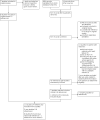
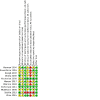
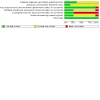
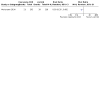
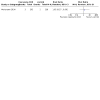
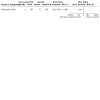
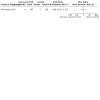
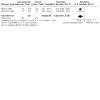
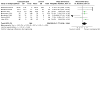
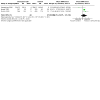
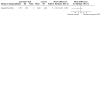
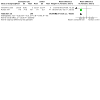
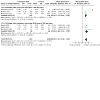
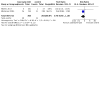
Update of
-
Coenzyme Q10 for heart failure.Cochrane Database Syst Rev. 2014 Jun 2;(6):CD008684. doi: 10.1002/14651858.CD008684.pub2. Cochrane Database Syst Rev. 2014. Update in: Cochrane Database Syst Rev. 2021 Feb 03;(2):CD008684. doi: 10.1002/14651858.CD008684.pub3. PMID: 24049047 Updated. Review.
Similar articles
-
Coenzyme Q10 for heart failure.Cochrane Database Syst Rev. 2014 Jun 2;(6):CD008684. doi: 10.1002/14651858.CD008684.pub2. Cochrane Database Syst Rev. 2014. Update in: Cochrane Database Syst Rev. 2021 Feb 03;(2):CD008684. doi: 10.1002/14651858.CD008684.pub3. PMID: 24049047 Updated. Review.
-
Folic acid supplementation and malaria susceptibility and severity among people taking antifolate antimalarial drugs in endemic areas.Cochrane Database Syst Rev. 2022 Feb 1;2(2022):CD014217. doi: 10.1002/14651858.CD014217. Cochrane Database Syst Rev. 2022. PMID: 36321557 Free PMC article.
-
Coenzyme Q10 to manage chronic heart failure with a reduced ejection fraction: a systematic review and economic evaluation.Health Technol Assess. 2022 Jan;26(4):1-128. doi: 10.3310/KVOU6959. Health Technol Assess. 2022. PMID: 35076012
-
Beta-blockers in patients without heart failure after myocardial infarction.Cochrane Database Syst Rev. 2021 Nov 5;11(11):CD012565. doi: 10.1002/14651858.CD012565.pub2. Cochrane Database Syst Rev. 2021. PMID: 34739733 Free PMC article. Review.
-
Beta-blockers for suspected or diagnosed acute myocardial infarction.Cochrane Database Syst Rev. 2019 Dec 17;12(12):CD012484. doi: 10.1002/14651858.CD012484.pub2. Cochrane Database Syst Rev. 2019. PMID: 31845756 Free PMC article.
Cited by
-
Mitochondrial dysfunction in heart failure and its therapeutic implications.Front Cardiovasc Med. 2022 Aug 24;9:945142. doi: 10.3389/fcvm.2022.945142. eCollection 2022. Front Cardiovasc Med. 2022. PMID: 36093152 Free PMC article. Review.
-
Chronic Heart Failure in Children: State of the Art and New Perspectives.J Clin Med. 2023 Mar 30;12(7):2611. doi: 10.3390/jcm12072611. J Clin Med. 2023. PMID: 37048694 Free PMC article. Review.
-
Multifaceted roles of mitochondrial dysfunction in diseases: from powerhouses to saboteurs.Arch Pharm Res. 2023 Oct;46(9-10):723-743. doi: 10.1007/s12272-023-01465-y. Epub 2023 Sep 26. Arch Pharm Res. 2023. PMID: 37751031 Review.
-
Role of Dietary Patterns in the Progression and Management of Heart Failure in Pakistani Patients: A Multicenter Study.Cureus. 2024 Sep 13;16(9):e69373. doi: 10.7759/cureus.69373. eCollection 2024 Sep. Cureus. 2024. PMID: 39403666 Free PMC article.
-
Human cardiac metabolism.Cell Metab. 2024 Jul 2;36(7):1456-1481. doi: 10.1016/j.cmet.2024.06.003. Cell Metab. 2024. PMID: 38959861 Review.
References
References to studies included in this review
Berman 2004 {published data only}
Kawashima 2016 {published data only}
-
- JPRN-UMIN000012604. Effect of the REduced form of COenzyme Q10 Supplementation on endothelial function in chronic heart failure (RECOQS). apps.who.int/trialsearch/Trial2.aspx?TrialID=JPRN-UMIN000012604 (date of registration 17 December 2013).
-
- Kawashima C, Matsuzawa Y, Konishi M, Akiyama E, Suzuki H, Sato R, et al. Ubiquinol improves endothelial function in patients with heart failure with reduced ejection fraction: a single-center, randomized double-blind placebo-controlled crossover pilot study. American Journal of Cardiovascular Drugs 2020;20(4):363-72. - PubMed
-
- Kawashima C, Matsuzawa Y, Akiyama E, Sato R, Konishi M, Suzuki H, et al. Ubiquinol improves endothelial function in patients with heart failure with reduced ejection fraction: a single center, randomized double-blind placebo-controlled cross-over study. Circulation 2016;134(Suppl 1):Abstract 14946. - PubMed
Keogh 2003 {published data only}
-
- Keogh A, Fenton S, Leslie C, Aboyoun C, Macdonald P, Zhao YC, et al. Randomised double-blind, placebo-controlled trial of coenzyme Q10 therapy in class II and III systolic heart failure. Heart, Lung and Circulation 2003;12(3):135-41. - PubMed
Khatta 2000 {published data only}
-
- Khatta M, Alexander BS, Krichten CM, Fisher ML, Freudenberger R, Robinson SW, et al. The effect of coenzyme Q10 in patients with congestive heart failure. Annals of Internal Medicine 2000;132(8):636-40. - PubMed
Kocharian 2009 {published data only}
-
- Kocharian A, Shabanian R, Rafiei-Khorgami M, Kiani A, Heidari-Bateni G, Kocharian Armen, et al. Coenzyme Q10 improves diastolic function in children with idiopathic dilated cardiomyopathy. Cardiology in the Young 2009;19(5):501-6. - PubMed
-
- NCT02115581. Coenzyme Q10 supplementation in children with idiopathic dilated cardiomyopathy. clinicaltrials.gov/show/nct02115581 (first posted 16 April 2014).
Mareev 2017 {published data only}
-
- Mareev VY, Minina YV, Mareev YV. Coenzyme Q-10 in treatment of patients with heart failure: results Russian multicenter double blind placebo controlled study. European Journal of Heart Failure 2017;19(Suppl 1):56.
Morisco 1993 {published data only}
-
- Morisco C, Trimarco B, Condorelli M. Effect of coenzyme Q10 therapy in patients with congestive heart failure: a long-term multicenter randomized study. Clinical Investigator 1993;71(8 Suppl):S134-6. - PubMed
Mortensen 2014 {published data only}
-
- EUCTR 2005-002960-27-HU. Coenzyme Q10 as adjunctive treatment of chronic heart failure. A randomised double-blind multicenter trial with focus on symptoms, biomarker status (BNP) and long-term outcome (hospitalisation/mortality) (Q-Symbio). www.who.int/trialsearch/Trial2.aspx?TrialID=EUCTR2005-002960-27-HU (first entered 20 January 2006).
-
- ISRCTN94506234. Coenzyme Q10 as adjunctive treatment of chronic heart failure: a randomised, double-blind, multicentre trial with focus on SYMptoms, BIOmarker status (Brain-Natriuretic Peptide (BNP)), and long-term outcome (hospitalisations/mortality). www.isrctn.com/ISRCTN94506234 (date assigned 23 April 2007).
-
- Mortensen SA, Dolliner P, Filipiak KJ, Alehagen U, Pella D, Steurer G, et al. Is the therapeutic efficacy of coenzyme Q10 replicated in a geographical subgroup of the Q-SYMBIO study? European Heart Journal 2015;36:659-60.
-
- Mortensen SA, Kumar A, Dolliner P, Filipiak KJ, Pella D, Alehagen U, et al. Long-term results with coenzyme Q10 as adjunctive therapy in chronic heart failure. Heart 2013;99:A55-6.
Munkholm 1999 {published data only}
-
- Munkholm H, Hansen HH, Rasmussen K. Coenzyme Q10 treatment in serious heart failure. Biofactors 1999;9(2-4):285-9. - PubMed
Sobirin 2019 {published data only}
-
- ISRCTN96610559. Coenzyme Q10 supplementation in heart failure with preserved ejection fraction patients. www.isrctn.com/ISRCTN96610559 (date assigned 2 March 2018).
-
- Sobirin MA, Herry Y, Sofia SN, Uddin I, Rifqi S, Tsutsui H. Effects of coenzyme Q10 supplementation on diastolic function in patients with heart failure with preserved ejection fraction. Drug Discoveries & Therapeutics 2019;13(1):38-46. - PubMed
Zhao 2015 {published data only}
-
- Qingyan Z, Okello E, Yanhong T, Bing W, Congxin H. Effect of coenzyme Q10 administration on the incidence of atrial fibrillation in patients with heart failure. Circulation 2010;122(2):e209.
-
- Zhao Q, Kebbati AH, Zhang Y, Tang Y, Okello E, Huang C. Effect of coenzyme Q10 on the incidence of atrial fibrillation in patients with heart failure. Journal of Investigative Medicine 2015;63(5):735-9. - PubMed
References to studies excluded from this review
Adarsh 2008 {published data only}
-
- Adarsh K, Kaur H, Mohan V. Coenzyme Q10 (CoQ10) in isolated diastolic heart failure in hypertrophic cardiomyopathy (HCM). BioFactors (Oxford, England) 2008;32(1-4):145-9. - PubMed
Azuma 1992 {published data only}
-
- Azuma J, Sawamura A, Awata N. Usefulness of taurine in chronic congestive heart failure and its prospective application. Japanese Circulation Journal 1992;56(1):95-9. - PubMed
Baggio 1993 {published data only}
-
- Baggio E, Gandini R, Plancher AC, Passeri M, Carmosino G, the CoQ10 Drug Surveillance Investigators. Italian multicenter study on the safety and efficacy of coenzyme Q10 as adjunctive therapy in heart failure (interim analysis). Clinical Investigator 1993;71(8 Suppl):S145-9. - PubMed
Belardinelli 2005 {published data only}
-
- Belardinelli R, Mucaj A, Lacalaprice F, Solenghi M, Principi F, Tiano L, et al. Coenzyme Q10 improves contractility of dysfunctional myocardium in chronic heart failure. Biofactors 2005;25(1-4):137-45. - PubMed
Belardinelli 2008 {published data only}
-
- Belardinelli R, Tiano L, Littarru GP. Oxidative stress, endothelial function and coenzyme Q10. Biofactors 2008;32(1-4):129-33. - PubMed
Cascone 1985 {published data only}
-
- Cascone A, Cascone G, Alaimo A. Treatment of patients with congestive heart failure with coenzyme Q10 in an open trial. Bollettino Chimico Farmaceutico 1985;124(5):43S-52S. - PubMed
Chen 2017 {published data only}
-
- Yuanyuan C, Guozhen S, Xiaoran M. Research progress on correlation and intervention of micronutrients and chronic heart failure. Chinese Nursing Research 2017;31(34):4334-7.
Chen 2018 {published data only}
Chew 2008 {published data only}
Davini 1992 {published data only}
-
- Davini A, Cellerini F, Topi PL. Coenzyme Q10: contractile dysfunction of the myocardial cell and metabolic therapy. Minerva Cardioangiologica 1992;40(11):449-53. - PubMed
Fedacko 2009 {published data only}
-
- Fedacko J, Pella D, Rybar R. Influence of coenzyme Q10 supplementation in statin treated patients on left ventricular diastolic dysfunction. Results of randomised double-blind clinical study. European Heart Journal 2009;30:369-70.
Hall 1990 {published data only}
-
- Hall JH, Judy WV, Folkers K. Long-term survival in coenzyme Q10 treated congestive-heart-failure patients. Circulation 1990;82(4):675.
Hanping 1997 {published data only}
-
- Hanping Z, Guolong Y, Jing L, Jin H. The changes of PRA, ATII, ALD, ET and ANP in patients with left ventricular and intervention with enalapril. Bulletin of Hunan Medical University 1997;22(4):323-6. - PubMed
Hofman‐Bang 1995 {published data only}
-
- Hofman-Bang C, Rehnqvist N, Swedberg K, Wiklund I, Astrom H, the Q10 Study Group. Coenzyme Q10 as an adjunctive in the treatment of chronic congestive heart failure. Journal of Cardiac Failure 1995;1:101-7. - PubMed
IRCT2015070223018N1 {published data only}
-
- IRCT2015070223018N1. Effect of Q10 coenzyme in improving cardiac function. en.irct.ir/trial/19746 (date registered 11 August 2015).
Ishiyama 1976 {published data only}
-
- Ishiyama T, Morita Y, Toyama S, Yamagami T, Tsukamoto N. A clinical study of the effect of coenzyme Q on congestive heart failure. Japanese Heart Journal 1976;17(1):32-42. - PubMed
Iwabuchi 1972 {published data only}
-
- Iwabuchi T. Clinical efficacy of coenzyme Q10 for cardiac failure: a double-blind controlled comparison. Rinsho to Kenkyu (Japanese Journal of Clinical and Experimental Medicine) 1972;49(9):2604-8.
Johansson 2013 {published data only}
-
- Johansson P, Dahlstrom O, Dahlstrom U, Alehagen U. Effect of selenium and Q10 on the cardiac biomarker NT-proBNP. Scandinavian Cardiovascular Journal 2013;47(5):281-8. - PubMed
-
- Johansson P, Dahlstrom O, Dahlstrom U, Alehagen U. Improved health-related quality of life, and more days out of hospital with supplementation with selenium and coenzyme Q10 combined. Results from a double blind, placebo-controlled prospective study. Journal of Nutrition Health & Aging 2015;19(9):870-7. - PubMed
JPRN‐UMIN000007695 {published data only}
-
- JPRN-UMIN000007695. Comparison of effects of pitavastatin and rosuvastatin on patients with chronic heart failure. www.who.int/trialsearch/Trial2.aspx?TrialID=JPRN-UMIN000007695 (date of disclosure 10 April 2012).
JPRN‐UMIN000020203 {published data only}
-
- JPRN-UMIN000020203. Study of a heart failure treatment using a combination drug consisting of reduced coenzyme Q10, astaxanthin, citrulline, and zinc. www.who.int/trialsearch/Trial2.aspx?TrialID=JPRN-UMIN000020203 (date registered 15 December 2015).
JPRN‐UMIN000027248 {published data only}
-
- JPRN-UMIN000027248. Effects of reduced form of coenzyme Q10 (ubiquinol) on heart failure and arrhythmias. www.who.int/trialsearch/Trial2.aspx?TrialID=JPRN-UMIN000027248 (date of registration 1 October 2017).
Khatta 1999 {published data only}
-
- Khatta M, Alexander BS, Krichten CM, Fisher ML, Freudenberger RS, Robinson SW, et al. Long-term efficacy of coenzyme Q10 therapy for congestive heart failure. Circulation 1999;100(18):3411.
Kukharchik 2016 {published data only}
-
- Kukharchik G, Sichinava L, Burbello A, Yubrina I, Gaykovaya L, Sorokin L, et al. Analysis of changes of ECHO-cardiogram indices in patients with chronic heart failure during therapy with coenzyme Q10. European Journal of Heart Failure 2016;18:109.
Kukharchik 2016a {published data only}
-
- Kukharchik G, Sichinava L, Gaykovaya L, Burbello A, Yubrina I, Sorokin L. Some aspects of the effect of coenzyme Q10 on inflammatory processes, remodeling and functional status of endothelium in chronic heart failure. European Journal of Heart Failure 2016;18:399.
Kukharchik 2017 {published data only}
-
- Kukharchik G, Lobanova O, Sichinava L, Gaikovaya L, Ermakov A. The effect of coenzyme Q10 on the content of proinflammatory makers and the realization of the mitochondrial mechanism of apoptosis in chronic heart failure. Journal of the American College of Cardiology 2017;70(16):C145.
Kumar 2007 {published data only}
-
- Kumar A, Singh RB, Saxena M, Niaz MA, Josh SR, Chattopadhyay P, et al. Effect of carni Q-gel (ubiquinol and carnitine) on cytokines in patients with heart failure in the Tishcon study. Acta Cardiologica 2007;62(4):349-54. - PubMed
Kumar 2015 {published data only}
-
- Kumar A, Mohan V, Harharpreet K. Coenzyme Q10 as an adjuvant therapy in heart failure (HF). Cardiology 2015;131:345.
Lampertico 1993 {published data only}
-
- Lampertico M, Comis S. Italian multicenter study on the efficacy and safety of coenzyme Q10 as adjuvant therapy in heart-failure. Clinical Investigator 1993;71(8):S129-33. - PubMed
Langsjoen 1985 {published data only}
-
- Langsjoen PH, Vadhanavikit S, Folkers K. Effective treatment with coenzyme Q10 of patients with chronic myocardial disease. Drugs Under Experimental & Clinical Research 1985;11(8):577-9. - PubMed
Langsjoen 1985a {published data only}
Langsjoen 1988 {published data only}
-
- Langsjoen PH, Folkers K, Lyson K, Muratsu K, Lyson T, Langsjoen P. Effective and safe therapy with coenzyme Q10 for cardiomyopathy. Klinische Wochenschrift 1988;66(13):583-90. - PubMed
Langsjoen 1990 {published data only}
-
- Langsjoen PH, Langsjoen PH, Folkers K. Long-term efficacy and safety of coenzyme Q10 therapy for idiopathic dilated cardiomyopathy. American Journal of Cardiology 1990;65(7):521-3. - PubMed
Langsjoen 1994 {published data only}
-
- Langsjoen H, Langsjoen P, Langsjoen P, Willis R, Folkers K. Usefulness of coenzyme Q10 in clinical cardiology: a long-term study. Molecular Aspects of Medicine 1994;15 Suppl:s165-75. - PubMed
Langsjoen 2008 {published data only}
-
- Langsjoen PH, Langsjoen AM. Supplemental ubiquinol in patients with advanced congestive heart failure. Biofactors 2008;32(1-4):119-28. - PubMed
Leonova 2018 {published data only}
-
- Leonova I A, Boldueva S, Kuharchik G, Sichinava L, Gaykovaya L. Changing of some markers of inflammation and remodeling in post-infarction patients with chronic heart failure after ubidecarenone treatment. European Journal of Heart Failure 2018;20(Suppl 1):82-3.
Manzoli 1990 {published data only}
-
- Manzoli U, Rossi E, Littarru GP, Frustaci A, Lippa S, Oradei A, et al. Coenzyme Q10 in dilated cardiomyopathy. International Journal of Tissue Reactions 1990;12(3):173-8. - PubMed
Mazzola 1987 {published data only}
-
- Mazzola C, Guffanti EE, Vaccarella A. Noninvasive assessment of coenzyme Q10 in patients with chronic stable effort angina and moderate heart failure. Current Therapeutic Research, Clinical and Experimental 1987;41(6):923-32.
McMurray 2009 {published data only}
-
- McMurray JJV, Kjekshus J, Dunselman P, Hjalmarson A, Wedel H, Lindberg M, et al. Prognostic importance of co-enzyme Q10 in heart failure and interaction with statin therapy in the controlled rosuvastatin Mmltinational trial in heart failure trial (CORONA). European Heart Journal 2009;30:1027.
Miyazaki 2013 {published data only}
-
- Miyazaki T, Shimizu M, Takagi A, Kato T, Suda S, Hiki M, et al. Coenzyme Q10 levels are associated with occurrence of cardiogenic shock and in-hospital death in patients admitted to coronary care unit. Circulation 2013;128(22):Abstract 17490.
Morisco 1994 {published data only}
-
- Morisco C, Nappi A, Argenziano L, Sarno D, Fonatana D, Imbriaco M, et al. Noninvasive evaluation of cardiac hemodynamics during exercise in patients with chronic heart failure: effects of short-term coenzyme Q10 treatment. Molecular Aspects of Medicine 1994;15 Suppl:s155-63. - PubMed
Mortensen 1985 {published data only}
-
- Mortensen SA, Vadhanavikit S, Baandrup U, Folkers K. Long-term coenzyme Q10 therapy: a major advance in the management of resistant myocardial failure. Drugs under Experimental and Clinical Research 1985;11(8):581-93. - PubMed
NCT03586414 {published data only}
-
- NCT03586414. MitoQ supplementation and cardiovascular function in healthy men and women. clinicaltrials.gov/show/nct03586414 (first posted 13 July 2018).
Nishimura 1996 {published data only}
-
- Nishimura T, Hori M. Therapeutic effects of coenzyme Q10 on dilated cardiomyopathy: assessment by 123I-BMIPP myocardial single photon emission computed tomography (SPECT): a multicenter trial in Osaka University Medical School Group. Kaku Igaku (Japanese Journal of Nuclear Medicine) 1996;33(1):27-32. - PubMed
Oleg 2016 {published data only}
-
- Medvedev O, Tokareva OG, Gorodetskaya EA, Kalenikova EI, Sizova ZM. CoQ10 treatment of patients with CHF and effects of BNP level. European Journal of Heart Failure 2016;18:107.
Permanetter 1992 {published data only}
-
- Permanetter B, Rossy W, Klein G, Weingartner F, Seidl KF, Blomer H. Ubiquinone (coenzyme Q10) in the long-term treatment of idiopathic dilated cardiomyopathy. European Heart Journal 1992;13(11):1528-33. - PubMed
Poggesi 1991 {published data only}
-
- Poggesi L, Galanti G, Comeglio M, Toncelli L, Vinci M. Effect of coenzyme Q10 on left ventricular function in patients with dilative cardiomyopathy. A medium-term randomized double-blind study versus placebo. Current Therapeutic Research, Clinical and Experimental 1991;49(5):878-86.
Pourmoghaddas 2014 {published data only}
-
- NCT01925937. Atorvastatin/coenzymeQ10 in congestive heart failure. clinicaltrials.gov/show/nct01925937 (first posted 20 August 2013).
Rivera 2017 {published data only}
Sacher 1997 {published data only}
-
- Sacher HL, Sacher ML, Landau SW, Kersten R, Dooley F, Sacher A, et al. The clinical and hemodynamic effects of coenzyme Q10 in congestive cardiomyopathy. American Journal of Therapeutics 1997;4(2-3):66-72. - PubMed
Saurabh 2014 {published data only}
-
- Saurabh S, Yadav A, Tiwari RK, Sharma A, Goyal YK, Jain A. Comparative study of Ubiquinone (CoQ10) and Krill oil in dilated cardiomyopathy. Indian Journal of Pharmacology 2014;46:S30.
Schneeberger 1984 {published data only}
-
- Schneeberger W, Zilliken F, Moritz J. Clinical studies with coenzyme Q10 in patients with congestive heart failure. Drugs Under Experimental and Clinical Research 1984;10(7):503-12.
Sinatra 2000 {published data only}
-
- Sinatra ST. Coenzyme Q10 and congestive heart failure. Annals of Internal Medicine 2000;133(9):745-6. - PubMed
Sinatra 2004 {published data only}
Turk 2013 {published data only}
-
- Turk S, Baki A, Solak Y, Kayrak M, Atalay H, Gaipov A, et al. Coenzyme Q10 supplementation and diastolic heart functions in hemodialysis patients: a randomized double-blind placebo-controlled trial. Hemodialysis International 2013;17(3):374-81. - PubMed
Watson 1999 {published data only}
-
- Watson PS, Scalia GM, Galbraith A, Burstow DJ, Bett N, Aroney CN, et al. Lack of effect of coenzyme Q on left ventricular function in patients with congestive heart failure. Journal of the American College of Cardiology 1999;33(6):1549-52. - PubMed
Witte 2005 {published data only}
-
- Witte KK, Nikitin NP, Parker AC, Von Haehling S, Volk HD, Anker SD, et al. The effect of micronutrient supplementation on quality-of-life and left ventricular function in elderly patients with chronic heart failure. European Heart Journal 2005;26(21):2238-44. - PubMed
References to ongoing studies
NCT02779634 {published data only}
-
- NCT02779634. Ubiquinol treatment in patients with heart failure and preserved ejection fraction. clinicaltrials.gov/show/nct02779634 (first posted 20 May 2016).
Pierce 2018 {published data only}
-
- NCT03133793. CoQ10 and d-ribose in patients with diastolic heart failure. clinicaltrials.gov/show/nct03133793 (first posted 28 April 2017).
-
- Pierce J D, Mahoney D E, Hiebert J B, Thimmesch A R, Diaz F J, Smith C, et al. Study protocol, randomized controlled trial: reducing symptom burden in patients with heart failure with preserved ejection fraction using ubiquinol and/or D-ribose. BMC Cardiovascular Disorders 2018;18(1):57. - PMC - PubMed
Additional references
Baggio 1994
-
- Baggio E, Gandini R, Plancher AC, Passeri M, Carmosino G. Italian multicenter study on the safety and efficacy of coenzyme Q10 as adjunctive therapy in heart failure. Molecular Aspects of Medicine 1994;15:s287-94. - PubMed
Belch 1991
Berthold 2006
-
- Berthold HK, Naini A, Di Mauro S, Hallikainen M, Gylling H, Krone W, et al. Effect of ezetimibe and/or simvastatin on coenzyme Q10 levels in plasma: a randomised trial. Drug Safety 2006;29(8):703-12. - PubMed
Bhagavan 2007
-
- Bhagavan HN, Chopra RK. Plasma coenzyme Q10 response to oral ingestion of coenzyme Q10 formulations. Mitochondrion 2007;7S:S78-88. - PubMed
Boon 2006
-
- Boon NA, Colledge NR, Walker BR, Hunter JAA. Davidson's Principles and Practice of Medicine. 20th edition. Churchill Livingstone, 2006.
Clinical Evidence
-
- BMJ Clinical Evidence. EBM Tools: Glossary. clinicalevidence.bmj.com/ceweb/resources/glossary.jsp#Random_effects (accessed 16 January 2010).
De Blasio 2015
-
- De Blasio MJ, Huynh K, Qin C, Rosli S, Kiriazis H, Ayer A, et al. Therapeutic targeting of oxidative stress with coenzyme Q10 counteracts exaggerated diabetic cardiomyopathy in a mouse model of diabetes with diminished PI3K (p110α) signaling. Free Radical Biology and Medicine 2015;87:137-47. - PubMed
Diaz‐Velez 1996
-
- Diaz-Velez CR, Garcia-Castineiras S, Mendoza-Ramos E, Hernandez-Lopez E. Increased malondialdehyde in peripheral blood of patients with congestive heart failure. American Heart Journal 1996;131(1):146-52. - PubMed
Drexler 2004
-
- Drexler H, Hasenfuss G. Physiology of the normal and failing heart. In: Crawford MH, DiMarco JP, Paulus WJ, editors(s). Cardiology. 2nd edition. Edinburgh: Mosby, 2004:829.
Egger 1997
Elesber 2001
-
- Elesber AA, Redfield MM. Approach to patients with heart failure and normal ejection fraction. Mayo Clinic Proceedings 2001;76(10):1047-52. - PubMed
Folkers 1990
Fotino 2013
Gottdiener 2002
-
- Gottdiener JS, McClelland RL, Marshall R, Shemanski L, Furberg CD, Kitzman DW, et al. Outcome of congestive heart failure in elderly persons: influence of left ventricular systolic function. The Cardiovascular Health Study. Annals of Internal Medicine 2002;137(8):631-9. - PubMed
Greenberg 1990
-
- Greenberg S, Frishman WH. Co-enzyme Q10: a new drug for cardiovascular disease. Journal of Clinical Pharmacology 1990;30(7):596-608. - PubMed
Gutierrez‐Mariscal 2019
-
- Gutierrez-Mariscal FM, Yubero-Serrano EM, Villalba JM, Lopez-Miranda J. Coenzyme Q10: from bench to clinic in aging diseases, a translational review. Critical Reviews in Food Science and Nutrition 2019;59(14):2240-57. - PubMed
Heck 2000
-
- Heck AM, DeWitt BA, Lukes AL. Potential interactions between alternative therapies and warfarin. American Journal of Health-system Pharmacy 2000;57(13):1221-7. - PubMed
Higgins 2003
Higgins 2011
-
- Higgins JPT, Green S, editor(s). Cochrane Handbook for Systematic Reviews of Interventions Version 5.1.0 (updated March 2011). The Cochrane Collaboration, 2011. Available from training.cochrane.org/handbook/archive/v5.1/.
Higgins 2019
-
- Higgins JP, Thomas J, Chandler J, Cumpston M, Li T, Page MJ, et al, editor(s). Cochrane Handbook for Systematic Reviews of Interventions Version 6.0 (updated July 2019). Cochrane, 2019. Available from www.training.cochrane.org/handbook. - PMC - PubMed
Ho 1993
-
- Ho KK, Pinsky JL, Kannel WB, Levy D. The epidemiology of heart failure: the Framingham study. Journal of the American College of Cardiology 1993;22:6A-13A. - PubMed
Kishi 1977
-
- Kishi T, Watanabe T, Folkers K. Bioenergetics in clinical medicine XV. Inhibition of coenzyme Q10 enzymes by clinically used adrenergic blockers of beta-receptors. Research Communications in Chemical Pathology and Pharmacology 1977;17(1):157-64. - PubMed
Lefebvre 2011
-
- Lefebvre C, Manheimer E, Glanville J. Chapter 6: Searching for studies. In: Higgins JP, Green S, editor(s). Cochrane Handbook for Systematic Reviews of Interventions Version 5.1.0 (updated March 2011). The Cochrane Collaboration, 2011. Available from training.cochrane.org/handbook/archive/v5.1/.
Lippi 2020
-
- Lippi G, Sanchis-Gomar F. Global epidemiology and future trends of heart failure. AME Medical Journal 2020;5(15):1-6. [DOI: 10.21037/amj.2020.03.03] - DOI
Madmani 2014
McMurray 1990
-
- McMurray J, McLay J, Chopra M, Bridges A, Belch JJ. Evidence for enhanced free radical activity in chronic congestive heart failure secondary to coronary artery disease. American Journal of Cardiology 1990;65(18):1261-2. - PubMed
McMurray 1993
-
- McMurray J, Chopra M, Abdullah I, Smith WE, Dargie HJ. Evidence of oxidative stress in chronic heart failure in humans. European Heart Journal 1993;14(11):1493-8. - PubMed
Migliore 2004
-
- Migliore L, Molinu S, Naccarati A, Mancuso M, Rocchi A, Siciliano G. Evaluation of cytogenetic and DNA damage in mitochondrial disease patients: effects of coenzyme Q10 therapy. Mutagenesis 2004;19(1):43-9. - PubMed
Moher 1998
-
- Moher D, Pham B, Jones A, Cook DJ, Jadad A, Moher M, et al. Does quality of reports of randomised trials affect estimates of intervention efficacy reported in meta-analysis. Lancet 1998;352:609-13. - PubMed
Moher 2009
Molyneux 2008
-
- Molyneux SL, Florkowski CM, George PM, Pilbrow AP, Frampton CM, Lever M, et al. Coenzyme Q10: an independent predictor of mortality in chronic heart failure. Journal of the American College of Cardiology 2008;52(18):1435-41. - PubMed
Mortensen 1984
-
- Mortensen SA, Vadhanavikit S, Folkers K. Deficiency of coenzyme Q10 in myocardial failure. Drugs under Experimental and Clinical Research 1984;X(7):497-502. - PubMed
Mortensen 1990
-
- Mortensen SA, Vadhanavikit S, Muratsu K, Folkers K. Coenzyme Q10: clinical benefits with biochemical correlates suggesting a scientific breakthrough in the management of chronic heart failure. International Journal of Tissue Reactions 1990;12(3):155-62. - PubMed
Mortensen 1993
-
- Mortensen SA. Perspectives on therapy of cardiovascular diseases with coenzyme Q10 (ubiquinone). Clinical Investigator 1993;71(8 Suppl):S116-23. - PubMed
Mortensen 1997
-
- Mortensen SA, Leth A, Agner E, Rohde M. Dose-related decrease of serum coenzyme Q10 during treatment with HMG-CoA reductase inhibitors. Molecular Aspects of Medicine 1997;18(Suppl):S137-44. - PubMed
Niklowitz 2007
Nishiyama 1998
-
- Nishiyama Y, Ikeda H, Haramaki N, Yoshida N, Imaizumi T. Oxidative stress is related to exercise intolerance in patients with heart failure. American Heart Journal 1998;135(1):115-20. - PubMed
NYHA 1964
-
- Criteria Committee, New York Heart Association. Diseases of the Heart and Blood Vessels: Nomenclature and Criteria for Diagnosis. 6th edition. Boston: Little, Brown and Co, 1964.
Ponikowski 2016
-
- Ponikowski P, Voors AA, Anker SD, Bueno H, Cleland JG, Coats AJ, et al. 2016 ESC Guidelines for the diagnosis and treatment of acute and chronic heart failure: the Task Force for the Diagnosis and Treatment of Acute and Chronic Heart Failure of the European Society of Cardiology (ESC) developed with the special contribution of the Heart Failure Association (HFA) of the ESC. European Heart Journal 2016;37(27):2129-200. - PubMed
Raizner 2019
Rauchova 1995
-
- Rauchova H, Drahota Z, Lenaz G. Function of coenzyme Q in the cell: some biochemical and physiological properties. Physiological Research 1995;44(4):209-16. - PubMed
Redfield 2016
-
- Redfield MM. Heart failure with preserved ejection fraction. New England Journal of Medicine 2016;375(19):1868-77. - PubMed
Review Manager 2020 [Computer program]
-
- Review Manager 5 (RevMan 5). Version 5.4. The Cochrane Collaboration, 2020.
Richardson 1996
-
- Richardson P, McKenna W, Bristow M, Maisch B, Mautner B, O'Connell J, et al. Report of the 1995 Word Health Organization/International Society and Federation of Cardiology Task Force on the Definition and classification of cardiomyopathies. Circulation 1996;93:841-2. - PubMed
Rodriguez 2004
-
- Rodriguez-Artalejo F, Banegas Banegas JR, Guallar-Castillon P. Epidemiology of heart failure [Epidemiologia de la insuficiencia cardiaca]. Revista Espanola de Cardiologia 2004;57(2):163-70. - PubMed
Rosenfeldt 2003
-
- Rosenfeldt F, Hilton D, Pepe S, Krum H. Systematic review of effect of coenzyme Q10 in physical exercise, hypertension and heart failure. BioFactors (Oxford, England) 2003;18(1-4):91-100. [PMID: ] - PubMed
Sander 2006
-
- Sander S, Coleman CI, Patel AA, Kluger J, White CM. The impact of coenzyme Q10 on systolic function in patients with chronic heart failure. Journal of Cardiac Failure 2006;12(6):464-72. [PMID: ] - PubMed
Savarese 2017
Singh 1999
-
- Singh RB, Niaz MA, Rastogi SS, Shukla PK, Thakur AS. Effect of hydrosoluble coenzyme Q10 on blood pressures and insulin resistance in hypertensive patients with coronary artery disease. Journal of Human Hypertension 1999;13(2):203-8. - PubMed
Soja 1997
-
- Soja AM, Mortensen SA. Treatment of congestive heart failure with coenzyme Q10 illuminated by meta-analyses of clinical trials. Molecular Aspects of Medicine 1997;18 Suppl:S159-68. [PMID: ] - PubMed
Tappel 1972
-
- Tappel AL. Vitamin E and free radical peroxidation of lipids. Annals of The New York Academy of Sciences 1972;203:12-21. - PubMed
Teerlink 1991
-
- Teerlink JR, Goldhaber SZ, Preffer MA. An overview of contemporary etiologies of congestive heart failure. American Heart Journal 1991;121:1852-3. - PubMed
Tsai 2012
-
- Tsai KL, Huang YH, Kao CL, Yang DM, Lee HC, Chou HY, et al. A novel mechanism of coenzyme Q10 protects against human endothelial cells from oxidative stress-induced injury by modulating NO-related pathways. Journal of Nutritional Biochemistry 2012;23(5):458-68. - PubMed
Tsutsui 2002
-
- Tsutsui T, Tsutamoto T, Wada A, Maeda K, Mabuchi N, Hayashi M, et al. Plasma oxidized low-density lipoprotein as a prognostic predictor in patients with chronic congestive heart failure. Journal of the American College of Cardiology 2002;39(6):957-62. - PubMed
Virani 2020
Yancy 2017
-
- Yancy CW, Jessup M, Bozkurt B, Butler J, Casey DE, Colvin MM, et al. 2017 ACC/AHA/HFSA focused update of the 2013 ACCF/AHA guideline for the management of heart failure: a report of the American College of Cardiology/American Heart Association Task Force on Clinical Practice Guidelines and the Heart Failure Society of America. Circulation 2017;136(6):e137-61. [DOI: 10.1161/CIR.0000000000000509] - DOI - PubMed
References to other published versions of this review
Publication types
MeSH terms
Substances
Supplementary concepts
LinkOut - more resources
Full Text Sources
Medical

